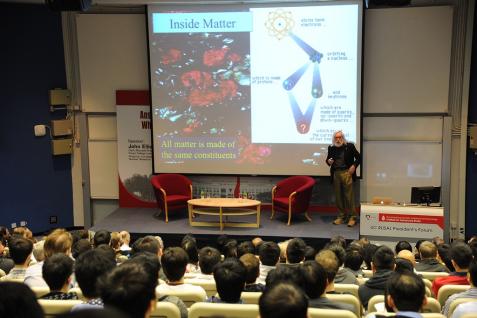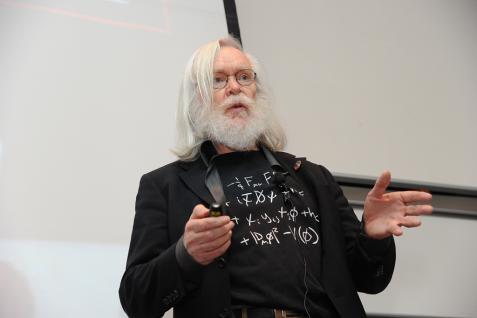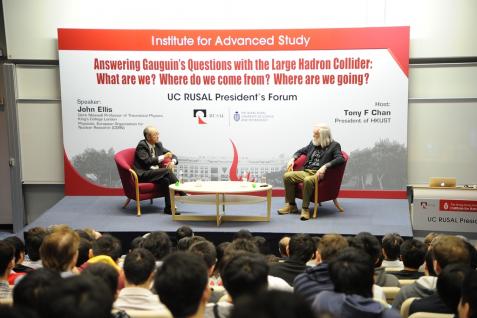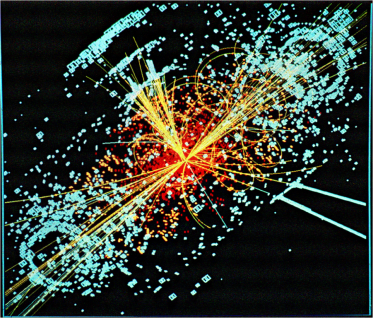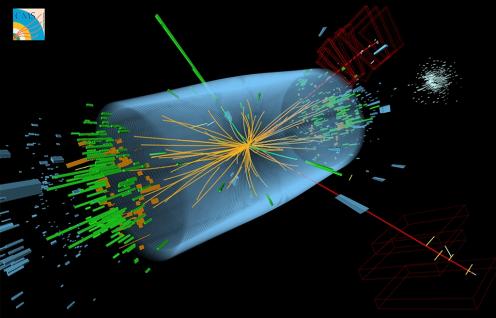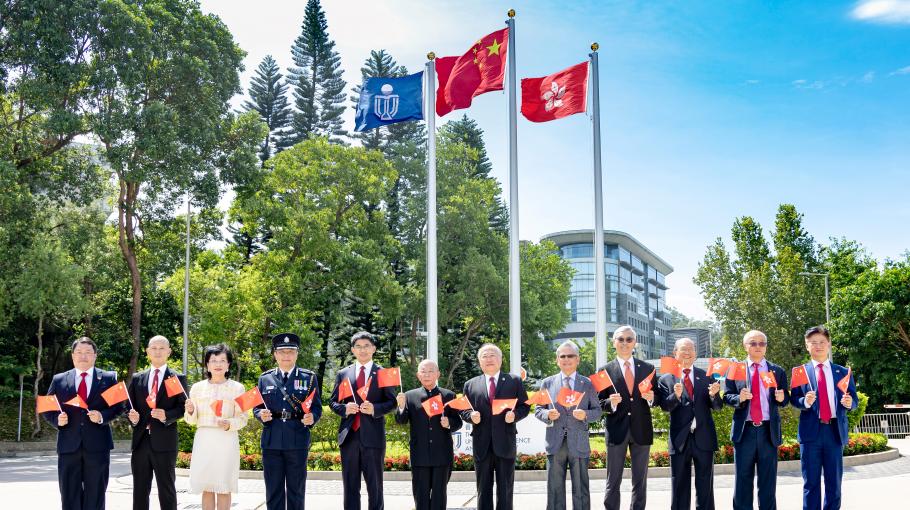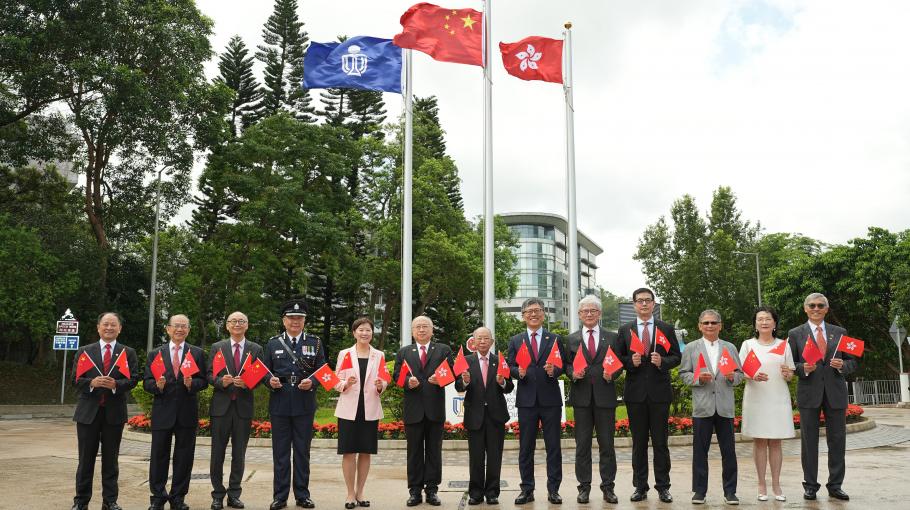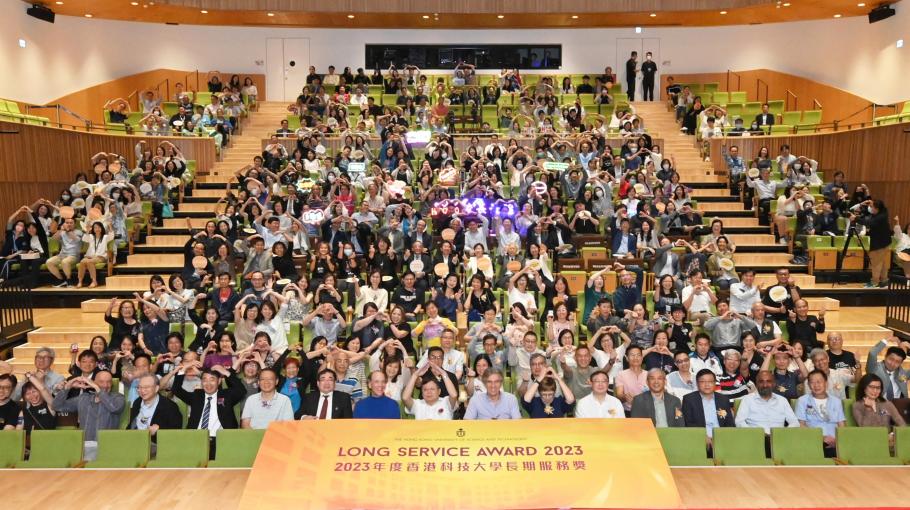UC RUSAL (SEHK: 486, Euronext: RUSAL/RUAL, Moscow Exchange: RUALR/RUALRS), a leading global aluminium producer, and the Hong Kong University of Science and Technology (HKUST) hosted the UC RUSAL President's Forum today featuring Prof John Ellis, Clerk Maxwell Professor of Theoretical Physics at King's College London and Physicist at European Organization for Nuclear Research (CERN) to address the most fundamental questions of physics and the cosmos.
At the Forum hosted by Prof Tony F Chan, President of HKUST, the world-renowned British theoretical physicist and Maxwell Medalist Prof John Ellis shared his insights on the prospects of finding the answers posed in Paul Gauguin's famous paintings: "What are we? Where do we come from? Where are we going?" Putting Gauguin's questions in the language of particle physics, Prof Ellis asked, "What is matter made of? Why do things weigh? What is the origin of matter? What is dark matter that fills the Universe? How does the Universe evolve? Why is the Universe so big and old? Are there additional dimensions of space?"
Prof Ellis focused on the new particle discovered recently at the Large Hadron Collider (LHC) at CERN, which may be the Higgs boson. He analogized the Higgs boson to a piece missing right in the middle of the giant jigsaw puzzle, the Standard Model which describes all fundamental particle physics. He further explained that the existence of the Higgs boson is extremely significant because without it, there would be no atoms. Electrons would escape at the speed of light, and weak interactions would not be weak. In short, life would be impossible: everything would be radioactive. The Higgs boson provides the masses of elementary particles, making possible the existence of atoms and explaining why human beings do not glow in the dark.
Finding the Higgs boson is one of the most important tasks of CERN's LHC which is the world's most powerful particle accelerator and one of the largest scientific experiments ever to address the most fundamental questions of physics and the cosmos. The LHC is also the emptiest space in the solar system and the hottest place in the galaxy, with particle collisions creating temperatures which are a billion times higher than the heart of the sun.
"We physicists try to understand how the Universe became what it is today, what it is made of, what it could become in future. To do that, we use the LHC at CERN to analyze what makes up the Universe," said Prof Ellis. "Finding the Higgs boson is a quest that brings together scientists from around the world, and we look forward to greater participation by Hong Kong and the region in future."
HKUST President Tony F Chan stated that it is the University's honor to have Prof Ellis share with the University community CERN's latest breakthrough discovery. HKUST had two students participating at CERN's first rate research last year, and the University is keen to have greater opportunities to collaborate with top-notch laboratories to drive world-changing scientific discoveries.
Prof Ellis graduated from King's College, Cambridge, in 1971 with a PhD in theoretical high-energy particle physics. After two post-doctoral positions at SLAC (now SLAC National Accelerator Laboratory) and Caltech, he settled in CERN in Geneva and held a permanent contract there from 1978. In 1982 and 2005, Prof Ellis was awarded the Maxwell Medal and the Paul Dirac Prize respectively by the Institute of Physics. He was elected Fellow of the Royal Society of London in 1985 and of the Institute of Physics in 1991, and is an Honorary Fellow of King's College Cambridge and of the Serbian Physical Society. Having authored nearly 1,000 scientific papers, some with over 50,000 citations, he is the second most-cited theoretical physicist in the world.
Ms Vera Kurochkina, UC RUSAL's Board Member and Deputy CEO, Director of Corporate Communications, said, "The mission of UC RUSAL President's Forum is to bring the world's most inspiring individuals to Hong Kong, to foster exchange of ideas and share exciting insights with the young generation - our pillars of the future. We are honored by the presence of the world renowned Maxwell Medalist, Prof John Ellis. In particular, we are delighted that the forum has received such an enthusiastic response from the local community. We will continue to support and bring the great minds of the world to Hong Kong, so as to strengthen scientific and educational ties between Russia, Mainland China and Hong Kong."
The UC RUSAL President's Forum
The UC RUSAL President's Forum is organized under the auspices of the HKUST Institute for Advanced Study and is held biannually in Hong Kong. Prestigious scholars and scientists as well as successful business leaders and entrepreneurs are invited to share with the audience their views on varied topics including the latest trends in science and technology and its relationship with and impact on humankind, knowledge transfer, entrepreneurship, innovation and creativity. Speakers also engage in a dialogue with the HKUST President. Previous Forum speakers include UC RUSAL CEO Mr Oleg Deripaska, Nobel Laureate in Economic Sciences Prof Christopher Pissarides, then-Chairman of Goldman Sachs Asset Management Dr Jim O'Neill, Chairman of Esquel Group Ms Marjorie Yang and Chairman of Hong Kong Mercantile Exchange Mr Barry Cheung.
About UC RUSAL
UC RUSAL (www.rusal.com) is a leading global aluminium producer, in 2012 accounting for approximately 9% of global production of aluminium and 8% of alumina. UC RUSAL employs about 72,000 people in 19 countries, across 5 continents. UC RUSAL markets and sells its products primarily in the European, Japanese, Korean, Chinese, South East Asian and North American markets. UC RUSAL's ordinary shares are listed on The Stock Exchange of Hong Kong Limited (Stock code: 486), global depositary shares representing UC RUSAL's ordinary shares are listed on the professional compartment of Euronext Paris (RUSAL for Reg S GDSs and RUAL for Rule 144A GDSs), and Russian depositary receipts that are issued on common shares of the Company are listed on Moscow Exchange (RUALR/RUALRS).
About the Hong Kong University of Science and Technology
The Hong Kong University of Science and Technology (HKUST) (www.ust.hk) is a top-ranked international research university excelling in science, technology and business as well as humanities and social science. Internationally renowned for its academic rigor and accomplishments, the University promotes interdisciplinary studies and provides holistic education, nurturing well-rounded graduates with a strong entrepreneurial spirit, innovative thinking and relevant skills to thrive in a knowledge economy. As an international university with strong ties to global thought leaders, HKUST has wide-ranging connections with Mainland China while aspiring to be a global premier knowledge hub and a center of research breakthroughs. HKUST was ranked Asia's number one for the second year in a row in 2012. It was placed third for the world's under-50 universities in 2012. The Kellogg-HKUST Executive MBA (EMBA) program, for the fourth straight year, topped the Financial Times EMBA global rankings.
For media enquiries, please feel free to contact :
The Hong Kong University of Science and Technology
Kit Yip
Tel: (852) 2358 6313
Email: kityip@ust.hk
UC RUSAL
Sadie Lam
Tel: (852) 2864-4861
Email: sadie.lam@sprg.com.hk
Sharon Lau
Tel: (852) 2114-4987
Email: sharon.lau@sprg.com.hk


